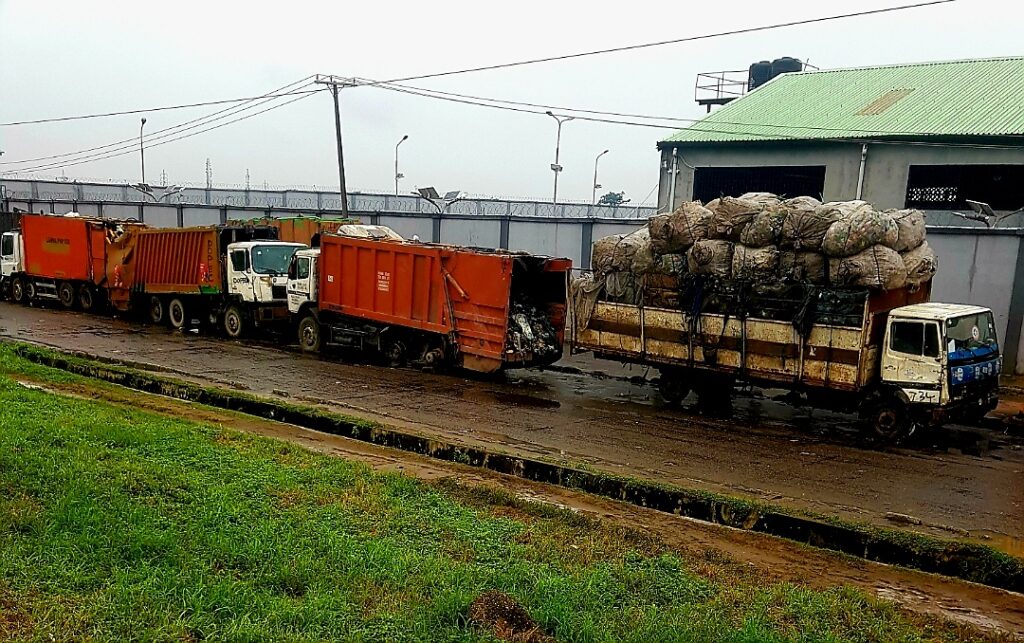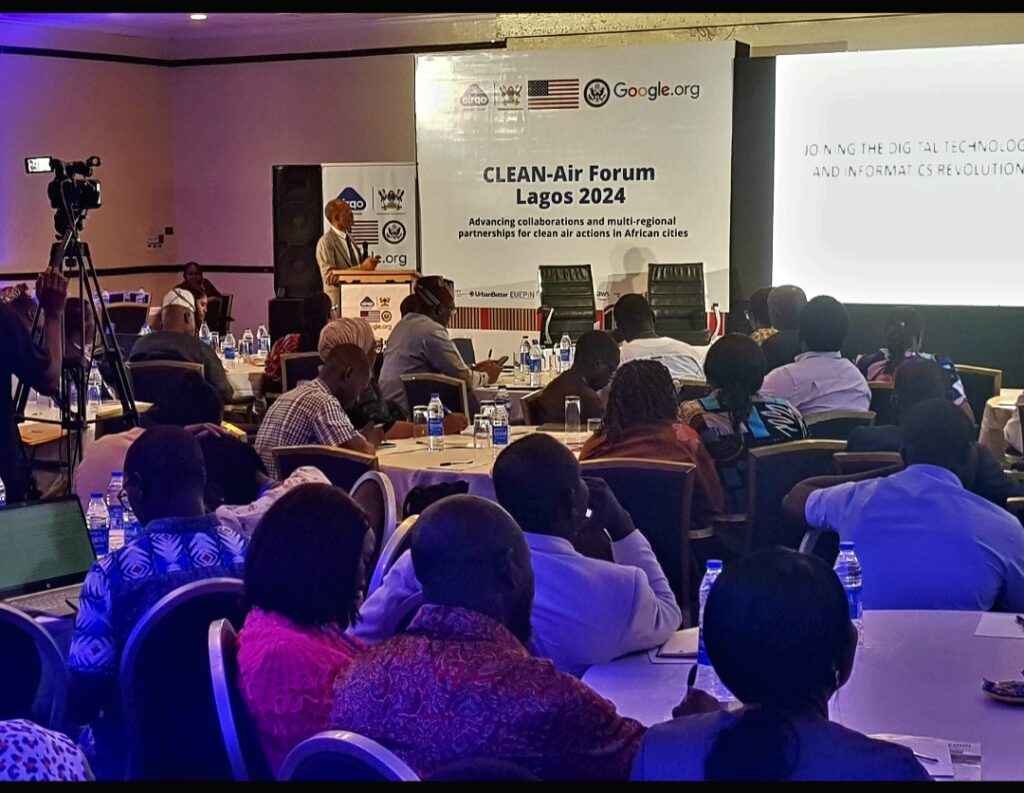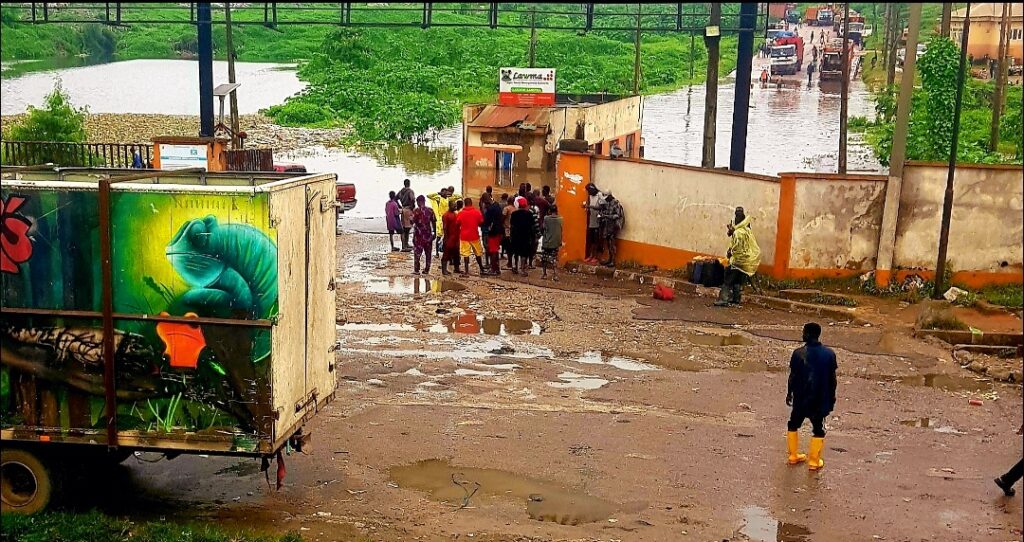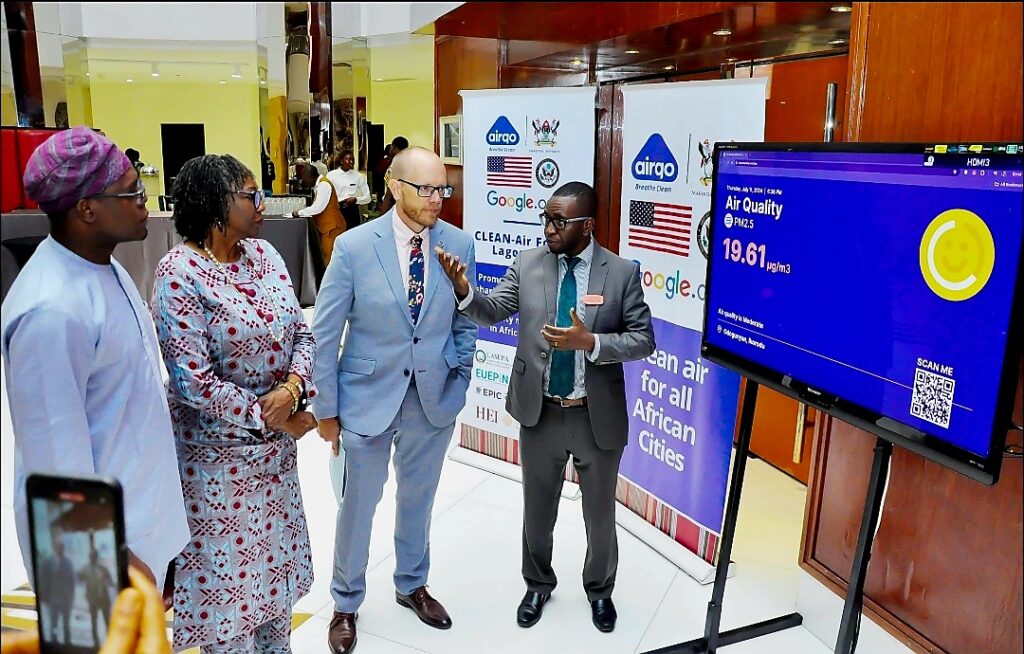Clean air in Africa: Lagos declares a state of emergency on air pollution, decommissioning dumpsites to commence
Plans to unveil an ambitious strategy to decommission notorious dump sites across Lagos state in the wake of air pollution and cholera outbreak within the next 18 months is to commence.
By Collins Odigie Ojiehanor
Lagos, with its burgeoning population and limited land area, faces severe challenges in managing solid waste. The city’s population has skyrocketed from 1.2 million in 1967 to over 22 million today, putting immense pressure on its waste management infrastructure. As a result, many of the city’s landfill sites, such as Olusosun and Alimoso, have become sources of significant air pollution.
The announcement to decommision these dumpsites was made recently during the Commissioner’s remarks at the close of the Lagos CLEAN-Air Forum 2024, organized by AirQo (CLEAN-Air Network), a gathering of over 300 participants from 40 cities across 40 countries at the Lagos Continental hotel, underscoring the global urgency to address air quality challenges. In his words, he said “For the dump sites, we agreed at the government that we have to decommission the Olusosun dumpsites and we have to do it within the next 18 months.”

This initiative comes as part of Lagos State’s comprehensive strategy to tackle air pollution and improve environmental quality amidst rapid urbanization and population growth.
Air pollution is a pervasive and escalating issue in many urban environments globally, and landfill stench is a significant but often overlooked contributor. Landfills and dumpsites, when not properly managed, release a variety of harmful pollutants into the air, creating a stench that is both a nuisance and a health hazard. This problem is particularly acute in rapidly growing cities such as Lagos, Nigeria, where indiscriminate waste disposal habits exacerbate the situation.
These sites emit methane, carbon dioxide, and other volatile organic compounds (VOCs) that contribute to the formation of ground-level ozone and smog. Additionally, the decomposition of organic waste in these landfills produces hydrogen sulfide, a gas with a characteristic rotten egg smell, which is not only unpleasant but also harmful to human health.
Wahab highlighted the exponential growth of Lagos, from 1.2 million inhabitants in 1967 to over 22 million today, all within a land area of just 3,507 square kilometers. This demographic explosion has intensified pollution concerns, particularly from industrial emissions, vehicular exhausts, and improperly managed waste.
“And for those who don’t know, Lagos, as it stands, was created in 1967 with a population of 1.2 million people. By 1980, it has grown to 2.5 million people. By year 2000, it has grown to 7.5 million people. And today we have over 22 to 24 million people staying in Lagos. And then, the size, the land size of Lagos is just 3,507 square kilometers of land. And then housing 22 million people. Just close your eyes and imagine the humongous pollution that will go on in this space” he highlighted.
Specifically addressing the issue of waste management, Wahab pointed out longstanding concerns with dump sites such as Olusosun and Alimoso, notorious for emitting hazardous pollutants into the air. These sites have been identified as major contributors to local air pollution, affecting nearby communities and exacerbating health risks.

“We have acknowledged the challenges posed by air pollution and have resolved to work together to address them,” Wahab stated, emphasizing the collaborative efforts with stakeholders and the community to combat environmental degradation.
Local Impact and Government Response
The stench from landfills is more than just an unpleasant odor; it is a sign of underlying environmental and public health issues. In Lagos, the situation is particularly critical due to the combination of rapid urbanization, inadequate waste management infrastructure, and poor waste disposal practices.
The Olusosun landfill, one of the largest in Africa, has been a focal point of these issues. Fires frequently break out at the site, releasing toxic fumes into the air and causing severe air quality deterioration. Residents living near these dumpsites are exposed to a continuous stream of pollutants that can lead to chronic health conditions.
According to Wahab, In Ikorodu, steel industries have been flagged for their contributions to air pollution, prompting ongoing engagements aimed at reducing emissions. Similarly, in Bariga, informal activities like fish roasting have inadvertently contributed to local air quality issues, prompting the government to provide sustainable alternatives and tools to mitigate pollution. “We’ve had an engagement with those steel industries in Ikorodu through the months. And then, we are enforcing our rapid capacity to enforce more. For the women at Bariga, we are advancing and giving them tools to use to stem the air pollution” he noted.
The decommissioning plan for Olusosun dumpsite, slated to be completed within the next 18 months, marks a significant step towards cleaner air in Lagos. This move aligns with Lagos State’s broader Roadmap for Transport, which emphasizes multimodal transportation and investments in waterways to reduce vehicular emissions.

Earlier, one of the key speakers, Dr. Rebecca Nantanda from the Makerere Lung Institute, emphasized the critical need for integrated air quality management strategies across African cities. She noted that effective waste management is a cornerstone of these strategies. “Effective waste management is fundamental to improving air quality and public health,” she stressed, echoing the thoughts shared by many participants at the forum.
The indiscriminate disposal of waste in Lagos exacerbates this issue. Due to inadequate waste collection services, many residents resort to dumping their waste in unauthorized areas, including open fields, streets, and waterways. This practice not only contributes to the proliferation of unsanitary conditions and the spread of diseases but also exacerbates the release of harmful gases from decomposing waste.
The lack of proper waste segregation means that biodegradable waste, plastics, metals, and hazardous materials are all dumped together, further complicating waste management and increasing the risk of harmful emissions.
A World Bank study highlights the dire situation of air pollution in Lagos, specifically noting the significant impact of waste disposal practices on air quality.
According to the study, improper waste management is one of the key contributors to air pollution in the city. The report underscores the need for comprehensive waste management strategies that include proper landfill management, waste segregation, recycling, and the development of waste-to-energy projects.

The study also points out the health impacts of air pollution, linking it to respiratory diseases, cardiovascular conditions, and other health problems that disproportionately affect vulnerable populations, such as children and the elderly.
Context within African Cities’ Clean Air Initiatives
According to AirQo project lead, Professor Engineer Bainomugisha, the Lagos CLEAN-Air Forum 2024, organized in collaboration with international and local partners signifies Africa’s commitment to sustainable development and environmental stewardship.
“This forum is a crucial platform for African cities to address air quality challenges and share innovative solutions to mitigate air pollution. The gathering has brought together experts, policymakers, and stakeholders from across the continent, all united in their goal to improve air quality and protect public health” he said.
Discussions at the forum have centered on various innovative strategies to combat air pollution, ranging from technological advancements to policy frameworks. Participants have shared best practices from different regions, showcasing successful initiatives and learning from each other’s experiences. The forum has also highlighted the importance of fostering global partnerships, as collaboration and knowledge exchange are vital for tackling the complex issue of air pollution.

The General Manager, Lagos State Environmental Protection Agency (LASEPA), Professor Folasade Tolulope Ogunsola, Vice Chancellor of the University of Lagos, Will Stevens, U.S Consul General Lagos and Professor Engineer Bainomugisha, the AirQo Project Lead taking a look at the air quality ratio at the Continental Hotel Lagos during the CLEAN Air Forum 2024. PC: Ojiehanor.
Moreover, the forum has highlighted the role of public awareness and community involvement in achieving clean air goals. Education campaigns are essential to inform residents about the health risks associated with air pollution and the importance of proper waste disposal. Engaging communities in these efforts ensures that policies and initiatives are effectively implemented and sustained over the long term.
The Lagos CLEAN-Air Forum 2024 has demonstrated that African cities are not only aware of the pressing issue of air pollution but are also actively seeking solutions and collaborating on a continental and global scale. The commitment shown by Lagos and other participating cities reflects a growing recognition of the need for integrated, sustainable approaches to urban development.
As Lagos State moves forward with its ambitious plans to decommission polluting dump sites and enhance waste management practices, the commitment to clean air and sustainable urban development remains paramount. By continuing to share knowledge, foster partnerships, and implement innovative strategies, African cities can make significant strides towards achieving clean air and improving the quality of life for their residents.





Comments